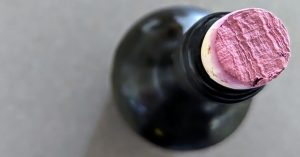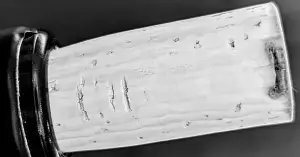
Most wines you drink every day are dry wines or table wines. However, sweet wines do exist.
Some wines are sweet to help balance out high alcohol and high acid. The sweetness you taste in wine is natural and called “residual sugar” in winemaking. It comes from grape juice. Many traditional wine styles are sweet. Sweet wines fall on a spectrum, from off-dry to lusciously sweet.
Here’s what you need to know about why some wines are sweet.
Why Is There Sugar in Wine? 4 Great Reasons

Why are some wines sweet? Your wine may have sugar in it to help balance out other structural components in the wine, like alcohol, body, and acid. Additionally, many wine drinkers around the world like a little sweetness in their wines and find them more enjoyable than fully dry table wines.
Balance, baby, balance.
Manipulating sweetness is one of the few ways a winemaker can alter a wine’s balance. They’d want to do this for a few reasons.
Reason 1: Sugar in Wine Balances Out Bitterness from Alcohol
Alcohol is bitter. High-alcohol wines may need a little sweetness to smooth over bitterness.
Cocktails cover alcoholic bitterness using fruit juice. A delicious masquerading trick, but definitely a reason people find themselves outside of tiki bars at 3 am pondering life choices after a few drinks.
Winemakers cover up alcoholic bitterness using the same technique as your favorite mixologist: grape juice.
Reason 2: Sugar in Wine Gives the Wine More Body
In thin wines, the winemaker may need to add sugar to create more body or weight to the wine.
Sugar adds weight to the wine by increasing its density.
Wines with a little grape juice in them will come across as heavier in your mouth, increasing the wine’s body.
Reason 3: Sugar in Wine Balances Out High Acid Levels
Last, but not least, some very high acid wines can benefit from sugar. Think unsweetened lemon juice vs. lemonade. Enough said.
Helpful Tip: Here’s a pos that covers everything you need to know about acid in wine. It’s a little nerdy, but may be just right for you.
So we have three structural reasons a wine may have a little sweetness, but drinking preferences also come into play.
Reason 4: Sweet Things Are Delicious
Unless you’re fortunate enough to grow up in a wine-loving family, most wine aficionados don’t start out with bone-dry table wines.
They start out with gateway wines that have a little kiss of sweetness to them. Many gateway wines are made to help introduce new drinkers to how wine tastes.
By including a bit of sweetness, a wine can appeal to a wider range of palates, making it more approachable (and easier to sell).
Think of all of the wines in the world like a funnel – the more consumers who enter the top of the funnel, the more who will eventually make it to the opposite end seeking out obscure wines and styles.
Producers know exactly who their target market is within the funnel and will make wines that can sell in that market.
White Zinfandel, anyone? White Zinfandel is credited with launching America’s thirst for wines by offering a sweet, easy-drinking rose wine.
Most inexpensive, simple wines made for everyday drinkers will have a little residual sugar: Meomi, Kendall Jackson Chardonnay, and Yellowtail Shiraz are great examples of table wines that have some sugar.
Where Does Sugar Come from in Wine?

Any sugar in wine comes from grapes, but there are 3 different paths to getting that grape juice into the wine.
- Sugar from Unfermented Grape Juice: The winemaker stopped early and there’s still “residual sugar” from the grape juice left over after fermentation.
- Sugar from Grape Juice Added Back to the Wine: The winemaker set aside some of the grape juice before fermentation and added it back after fermentation at a precise ratio to give the wine a little sweetness. This juice goes by the term süssreserve (seus-reserve) in German, literally “sweet reserve”.
- Sugar from Concentrated Grape Juice: The winemaker added in commercial-grade concentrated grape must during blending, called rectified concentrated grape must, or RCGM for short. This technique is common for entry-level wines made to appeal to a mass consumer market.
An important takeaway here is that if you’re concerned about the source of sugar, then you can relax.
Sweetness in wine is all-natural and comes from the grapes.
Helpful Tip: Here’s a more technical post on wine fermentation and how it works if you’re interested (or a little nerdy).
Which Wines Are Sweet?

- Moscato
- Riesling (may also be dry)
- Port
- White Zinfandel
- Ice wine
- Recioto della Valpolicella
- Sauternes
- Vin Doux Naturel
- Any bottle that says: ‘Dessert-style’
- Any sparkling wine that says ‘Demi-Sec’ or ‘Doux’
Final Thoughts – Why Are Some Wines Sweet?

Sweetness in wines is put there deliberately by the winemaker for a specific purpose.
The sugar in wine may be balancing out high acid, adding more body, or covering up high alcohol.
Whatever the reason, know that it’s helping to shape your wine and make it more enjoyable.
There’s a wine for everyone.
It all comes down to your preference. If you enjoy wines with a little sweetness, then look for those little sweetness indicators on your bottle to help you choose a wine that’s right for you.
Thirsty for More?
Check out this post that dives into how to figure out if the bottle you’re holding is a sweet wine or not. (You have to use those label clues)
Here’s a great post that goes into good sweet wine for beginners – table wines to dessert wines and so much more.
Go check out this post that will help you figure out how to read a wine label.




